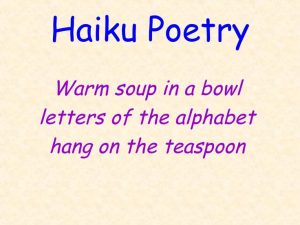
Timeline Of Nick’s Life In Poetry
There are poets and visionaries—souls who write to reveal the truth hidden in the ordinary,
Check out our store for the latest sales and promotions

A few words placed precisely properly have a very potent effect. You already understand why haiku is such a powerful form if you have ever read one that caused you to stop, take a moment to think, and breathe. How does it stack up against other poetry traditions, though? We are here to investigate that.
One of NVHA’s goals at The Writers House in Waterfront South is to foster poetry that has a profound emotional impact on people. We honor both ancient and modern forms through community, workshops, and creation. Knowing how haiku differs from poetry and what makes this simple form stand out in the vast array of other poetic forms is crucial as you start or advance your poetic journey.
This blog will explore haiku’s unique thematic simplicity, highlight how it stands apart from other styles, and help you appreciate why it continues to leave a lasting impression. Let’s take a walk through syllables, stanzas, and stillness together.
Poetry can take on countless forms and rhythms. The forms of poetry are as diverse as human passion itself, ranging from the rigid framework of a Shakespearean sonnet to the unruly flow of slam poetry.
The formal elegance of the 14-line stanza may appeal to aficionados of sonnets. Free poetry, on the other hand, is popular among modern voices because it allows poets to express themselves without being constrained by metrical rules. Odes exalt commonplace things or people, narrative poetry constructs epics that span pages, and ballads narrate stories.
When we compare haiku and free verse, we notice a fascinating contrast: while free verse revels in its openness, haiku thrives on precision. Where longer forms may use elaborate metaphors or layered symbolism, haiku often rests in nature, emotion, and a fleeting moment. And this contrast is exactly where the magic begins.
What distinguishes haiku from other forms of poetry, then? Its essence, not simply its structure, holds the answer.
Although haiku often has a 5-7-5 syllable structure, its potency extends beyond mathematics. The goal is to capture a single moment, usually from nature, and make something universal visible. Haiku is similar to a still snapshot in that it is basic but full of emotion, whereas other genres rely on narrative or metaphor.
A haiku provides no explanation. It is not convincing. It watches. It asks you to have a modest but meaningful experience. Many beginners make the mistake of overloading haiku with explanations or abstract concepts. But to understand what sets haiku apart, you must feel its pause, its silence, its respect for brevity. It’s not just short poetry—it’s postcard-sized philosophy.
Haiku and free verse work nearly like opposites, but in a lovely way, when we compare them.
Poets can use language anyway they like in free poetry since it throws the rules to the wind. It is jazz in writing—powerful, passionate, and surprising. Haiku, however, is a form of calm restraint. It flourishes in constraints, pushing the poet to accomplish more with less.
Each form has a role. Haiku may whisper, but free verse may shout it aloud. Haiku asks the reader to think, whereas free poetry allows the poet to express themselves. The purpose of this comparison is to appreciate various forms of poetry, not to take sides.
You learn the art of distillation and the art of growth by doing both. Discover the beauty in the little things by exploring the distinct thematic simplicity of haiku, and when you need to let go of your thoughts without filtering them, turn to free verse.
There’s a reason why a haiku, though only 17 syllables or less, can stay with someone for a lifetime. It’s not the brevity alone—it’s the clarity.
See why haiku leaves a lasting impression: it strips everything down to the bare truth. No fluff, no unnecessary detail. In a world of overstimulation, haiku offers a breath of calm. It gives the reader space to feel, interpret, and engage.
Other poetic forms can certainly move us, but haiku’s magic lies in its restraint. A well-crafted haiku can create a full emotional experience in just three lines. That’s why it often lingers longer than a hundred-line epic.
It’s also why haiku is so beloved in our haiku workshops USA, where poets learn to fine-tune their senses and trust in the weight of silence. Haiku teaches us not just how to write—but how to notice.
Haiku’s emotive approach is what really distinguishes it from other poetic forms, despite their structural differences. Haiku conveys emotion quickly, whereas a sonnet can take 14 lines to do it.
Because they anticipate to communicate more with more words, many poets who are new to the genre find it difficult. Haiku, however, allows you to communicate more with less. You only need to describe an autumn leaf dropping; you do not need to explain heartbreak. Its force lies in the suggested emotion.
If you’re unsure where to start, learn the basics before diving into common pitfalls. Begin by observing the world around you: a puddle after rain, a child’s laughter, a lone crow on a wire. These are the seeds of haiku. Then, read widely. See how haiku masters perfected the form—from Bashō to American haiku innovators like Jack Kerouac.
Writing does not have to be a solitary endeavor, so keep this in mind if you have ever struggled with poetic confidence. We provide welcoming environments at NVHA’s Writers House where poets from all walks of life can develop, learn, and share.
Do you want to improve your haiku? Participate in a class to hone your haiku writing abilities, network with other poets and authors, and receive insightful criticism that advances your work. In Camden, New Jersey, we host friendly gatherings for poets of all skill levels to discover the depths of haiku and beyond.
We want to create a center for poetry and creative learning, not only teach poetry. Our seminars support you in staying true to your creative goal, whether you are composing your first haiku or analyzing poetic forms.
Poetry is a vast garden. Some forms grow wild and sprawling; others are like bonsai—trimmed with intention. In the debate of haiku vs poetry, it’s clear that haiku holds a special place, not because it outshines other forms, but because it offers something beautifully different.
It reminds us that not every powerful poem needs to be long. Sometimes, all it takes is 17 syllables or less to change the way we see the world.
Whether you’re a curious beginner or a seasoned poet, take time to reflect on haiku—not just as a form, but as a way of seeing. Understand what sets haiku apart from other styles, explore its unique thematic simplicity, and trust its subtle power to leave a lasting mark.
And when you’re ready to go deeper, we invite you to visit our hub for poetry and creative learning. Your poetic journey is just beginning—and haiku may be the perfect first step.

There are poets and visionaries—souls who write to reveal the truth hidden in the ordinary,

New Jersey’s Camden. A city that had been a titan of shipbuilding and industry, more

Words that will reverberate over time were once written by a quiet voice amid the
Copyright © 2025 Nick VIrgilio Haiku Association. All rights reserved.

Alfred taught English to junior and senior high school students in New Jersey and Massachusetts prior to working for the municipal government of the City of Camden, New Jersey. He began working with the City of Camden Department of Planning & Development, Division of Housing Services, as a Cost Estimator for Property Improvement in 1984.
He spent the next thirty-eight years working in both the Division of Housing Services, and the Finance Department Bureau of Grants Management, helping the City administer state and federally funded affordable housing projects in Camden.
Alfred spent ten years working with the Bureau of Grants Management, where he reviewed and evaluated grant applications and proposals for funding from non-profit and for- profit housing developers. These agencies included St. Joseph’s Carpenter Society, Heart of Camden, Camden County OEO, Habitat for Humanity,
Camden Lutheran Housing, RPM Development and others. He also worked with social service agencies such as Dooley House, Respond Inc., Sikora House, Center for Family Services, and Volunteers of America, that applied for grant funding.
He also played a significant role in the planning and implementation of the Annual Consolidated Plan grant application submitted to the Department of Housing and Urban Development each year. The Bureau holds an annual grant funding seminar along with public meetings and technical assistance sessions concerning the C-Plan.
Working for the City of Camden Division of Housing Services Alfred also served as the coordinator of the federal funded HOPWA housing Program for 14 years.
HOPWA funds provided safe, affordable, secure, housing for persons with HIV/AIDS, by issuing housing vouchers to their participants. He managed the delivery of services to 80-90 clients a year, covering Camden, Burlington and Gloucester counties.
During his time working for the City of Camden Mr. Dansbury was a member of the CPAC Homeless Network Planning Committee, the Local Law Enforcement Block Grant Advisory Committee and United Neighbors of Whitman Park.
Outside of his work with the City of Camden, Alfred worked as an Adjunct Instructor of Reading Skills and Writing Skills at Camden County College, teaching at both the Camden and Blackwood campuses. In 2022 Alfred published,
“The Strength of Courage” a novel he embarked on as a graduate student in Rowan University’s M.A. in Writing program in 2014-2018.
He earned a Bachelor of Arts in English and Journalism from Rutgers University, a Master’s of Arts degree in Business Administration from Eastern University, a Master’s of Arts in Education from Eastern Michigan University and a Master’s of Arts in Writing from Rowan University.